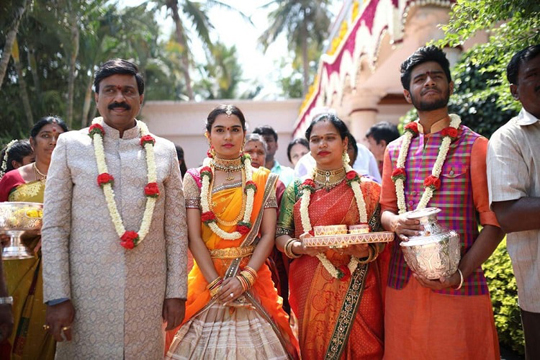Bengaluru, Nov 16: Karnataka minister and mining baron Gali Janardhan Reddy is in the eye of a political storm, a day before his daughter's wedding on Wednesday.

An activist has filed a complaint with the directorate general of income tax (investigations) questioning the extravagant nature of the wedding.
In the complaint, RTI activist T Narasimha Murthy said the arrangements have already raised eyebrows, whilepeople are standing in long queues after the demonetisation'
Tax officials refused to comment on the issue.
According to reports, Reddy has planned to recreate a model of the 16th century Vijayanagara palace at the Bengaluru Palace Grounds for the November 16 wedding.
Local media is abuzz with rumours that Bollywood star Shah Rukh Khan will perform at a wedding function on Tuesday but the claim could not be confirmed.
The Bellary mining baron was arrested in 2011 on charges of illegally mining iron ore and was in prison for over three years. His company, Obulapuram Mining Company, was alleged to have shifted the borders that separated the neighbouring districts of Ballary in Karnataka and Anantapur in Andhra Pradesh to extract ore. He was granted bail in January 2015 by the Supreme Court.
The wedding of Reddy's daughter Brahmani hit the headlines for lavish replicas of Hampi and Tirumala temples erected at the venue. Reportedly, Reddy hired art directors from Bollywood to design the sets.
All eyes are now on the guests, who will attend the wedding, to be held in Bengaluru on Wednesday.
Reddy was formerly a part of the BJP. He and his two brothers shot to limelight during the 1999 Lok Sabha elections by helping Sushma Swaraj's campaign, who lost to Sonia Gandhi in the Bellary seat.
Local media in the state was rife with speculation that Bharatiya Janata Party (BJP) leaders might have been asked to stay away from the event.
Reddy was the state tourism minister in BS Yeddyurappa's government before his arrest on graft charges related to the iron ore mining industry.
However, BJP national general secretary P Muralidhar Rao told Hindustan Times that no official diktat had been issued by the party's central leadership. “Why would the party get involved in someone's private function? It is not a party function for us to issue any orders,” he said.
The wedding is set to be exclusively telecast by Janasri TV, which was launched by Reddy and his close associate B Sriramulu, who is the MP from Bellary, even though media persons from across the publications have been invited to the event.





Comments
Reddy is using 100 Rupees notes and cheques.....he does not have any black money....
Nothing will happen because he is having the full support of Besharam Janatha party .
Add new comment